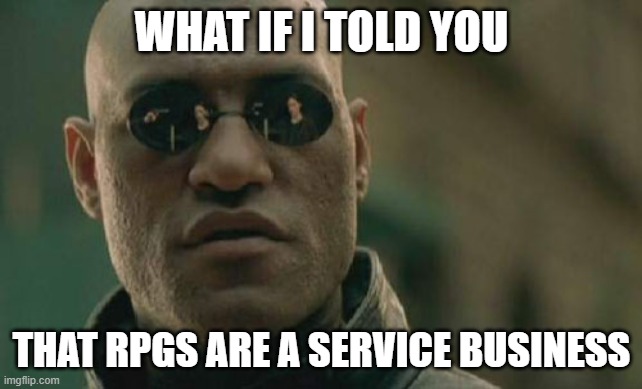I'm going to step on all sorts of toes today.
You've Got Problems
Now that we've talked about what the tabletop role-playing game is, as both a medium and a hobby, it is time to talk about it as a business.
The business of tabletop RPGs is that of a toy business, and toys are a business of product pushing and brand identification. That seems to work, until you look closer at who sells what. Then reality starts asserting itself; the tabletop RPG medium is a Network Dependent Medium- the value of a RPG is wholly dependent on the size of the user network that plays it, and how tightly interconnected that network is.
Ryan Dancey used this fact to justify selling the Open Game License (OGL) to Magic-Users By The Water (MuBTW) over 20 years ago, noting--correctly, as events proved thereafter--that the Revealed Preferene of the tabletop RPG user was to stick with the most dominant brand in a given genre, that Fantasy was the dominant brand overall, and so Dungeons & Dragons was THE RPG brand such that it suffers from the Kleenex/Xerox problem. (i.e. the brand is synonymous with the product/medium)
During the recent drama with MuBTW, he stated again what most competent business professional take as self-evidenct: the value is in the brand, not the product it's attached to. Insofar as we're talking about products, this is correct, but not with regard to where the value actually lies. The value is in the network; the brand is a shortcut to signal that network's value.
This misidentification of the value of the tabletop RPG medium is part-and-parcel of the cluster of dysfunctions that have afflicted tabletop RPGs since the 1970s. It explains why the business of this medium has always been a joke compared to videogames and other offshoots, such that when those other media successfully replicate a desired experience that users employ tabletop RPGs to achieve they always sheer off a significant portion of that network and make it their own.
The existing model, focused around pushing product--specifically, pushing large full-color textbook-sized hardcovers at textbook-level prices--that follows a model now recognized as the predatory one where the base game is a gimped and incomplete non-game that must be fixed with supplementary product (modules, expansions, etc.) seen in videogames (such that its most pernicious form, Free To Play/Pay To Win microtransactions, is known to be coming in the next edition) is not, has never been, and will never be sustainable in the long-term.
The proof is in the Edition Treadmill, where the long tail of supplementary material becomes too much and the model is reset with a new edition. Stupid British Toy Company (SBTC) does this deliberately to churn their customers, for they they disrepsect their customers as stupid paypigs (and, alas, they are not wrong) and have for decades, and MuBTW is doing the same for Magic: The Gathering.
This model is the norm. This model has been on a long-slow decline for over 20 years, maybe longer, and only by leeching off MuBTW via the OGL do most of them stay afloat; the rest are Boomer-tier with cult-like following (Palladium), run as self-funding hobbies (Gonnerman), live off (neo)patronage (most of them), pivoted out of RPGs as a signficant business (Dream Pod 9, Alderac, Fantasy Flight), or publish the dominant RPG in a genre other than fantasy (Chaosium, Catalyst, Far Future).

You're Doing It Wrong
Let me say this again: due to tabletop RPGs being wholly dependent on the Network Effect for their value, what matters is the network.
The business of tabletop RPGs is to serve that network. The product--and the brand--are nothing more than a funnel to draw people into that network. There is no need to bother with pushing reams of product on to that customer network; there is a constant, and evergreen, need to facilate the nodes of that network--the users--in connecting with one-another and making use of the product. This is where the money is.
In short, you're not shlepping books or toys. You're running a Private Club. Just as the RPG has its roots in 19th Century Prussia, the business model that goes with it is also from the 19th Century: The Social Club.
You publishers and designers need to stop thinking about selling Booky-Book and Accessories. Instead your the guy that gets paid to guarantee a place to play, a network of hobbyists to play with, and to gatekeep good and hard to assure that the users have a satisfactory experience- your business is Service Quality Assurance.
That's a big mindset switch, but if a pair of political dissidents can figure out how to make a living running a Member's Only club so can you.
This may be the best post I've seen on the topic. I have found it puzzling that the small RPG publishers who were early adopters on things like digital formats, direct to consumer, and crowd funding still don't understand this.
ReplyDeleteI was using the built in browser TTS to read this article. I was not prepared for her to read MuBTW as "Moo By The Way", nearly got a spit take from me.
ReplyDelete